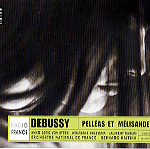Bernard Haitink’s reading of this glorious, misty work is gloriously misty, if that’s what you’re looking for. Haitink is a conductor who to my ears invariably refuses to interpret: he allows the music to speak for itself, with a steady hand and impeccable ear; but (at least in opera) he either doesn’t have any strong notion about “meaning” or he doesn’t care to share his information. This succeeds to a great extent with P&M, but while I admire Haitink’s distance and the languid manner in which he allows the languid moments of the score to unfold, in the end I find this reading somewhat faceless.
As one of the slowest P&M’s on disc, there’s great transparency and the storytelling is clear. Haitink’s Radio France Orchestra plays beautifully. The singing is uniformly good–even the terribly miscast Yniold of Florence Couderc, obviously and incorrectly a grown woman, is actually well sung. The three principals are impressive: Anne Sofie von Otter’s Mélisande is appropriately unknowable, but frankly, a bit too much so–she seems to have no profile whatsoever. Compare this with Maria Ewing for Abbado (obviously a sex-kitten), Victoria de los Angeles (weirdly girlish), and Soderstrom (too sophisticated) and you’ll feel a bit lost. Like Haitink, Otter’s leaving all doors open–but simply as voice she’s unmatchably nuanced. Wolfgang Holzmair’s Pelléas grows in passion as the opera goes on, until in his final scene he can barely contain himself. The top of his voice frays occasionally (and he does not sound young), but his fascination with Mélisande and the clear pickle he’s in is never in doubt. Again, I prefer Abbado’s Francois Le Roux, who’s smitten from the start and offers gorgeous singing throughout, with an Italianate legato that mirrors what Abbado does in the orchestra.
Laurent Naouri sings a rich-textured Golaud. He’s an angel until he discovers the missing ring; after that he whirls inexorably to the obsessed tower scene with Yniold and to a truly monstrous hair-pulling episode. I might add that he’s still out of control in the final scene–his grief and self-loathing are as terrifying as his rage. He’s in a class with the fantastic José van Dam (Abbado) and better than Donald McIntyre (with Boulez) who always sounds too gruff. The other singers are good enough.
And so, if you want a Pelléas et Mélisande in which the conductor stays out of it, the sound-stage is as matte-finished and white-bread-with-mayo as the interpretation, and Debussy’s music is treated with respect and love, this is for you. I will return to the Abbado for the most approachable, lyrical, and swirlingly-emotional performance and to Boulez if I want to hear every note Debussy wrote (albeit in a slightly too shiny acoustic). And frankly, this opera has done very well on discs: there are (at least) three other highly recommendable sets available as well.
































